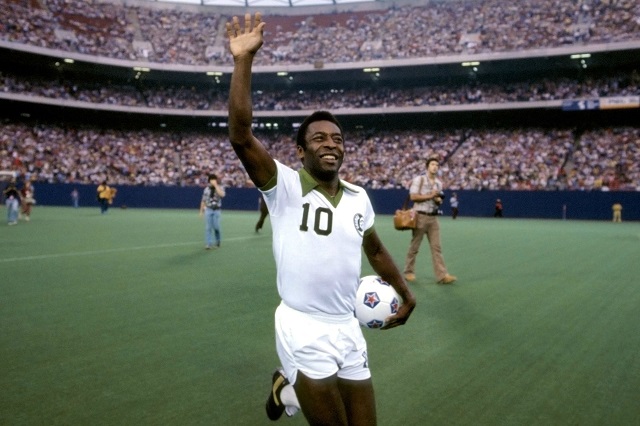
Rio De Janeiro, Brazil | Xinhua | Pele was three months shy of his 10th birthday when he made a promise to his father Dondinho.
The pair had just listened to a radio broadcast of Uruguay’s 2-1 victory over Brazil in the decisive match of the 1950 World Cup at Rio de Janeiro’s Maracana stadium, a result that later came to be known as the Maracanazo.
“For the first time I saw my father cry,” Pele said in a 2014 interview with FIFA.
“I told him: “Don’t cry, dad. I’m going to win the World Cup for you.”
Little could Dondinho have imagined that, only eight years later, his son would be carried off Stockholm’s Rasunda stadium on his teammates’ shoulders as the youngest ever World Cup champion.
Pele’s father was now crying tears of joy as Brazil celebrated their first World Cup trophy and the world hailed the birth of a global phenomenon.
Edson Arantes do Nascimento was born in Tres Coracoes, a farming town in the southeastern Brazilian state of Minas Gerais, the son of former Fluminense striker Dondinho and Celeste Arantes.
He is said to have earned the nickname Pele because of his mispronunciation of Vasco de Gama goalkeeper Bile, which was the subject of mirth among his peers.
He had a humble upbringing and earned his first salary by working as a waiter in a tea shop. Pele showed an interest in football at a young age and practiced with paper-filled socks because his parents were unable to afford a football.
His talent quickly became evident and by the age of 15, he earned his first contract with Brazilian giants Santos. Within a year he was the leading forward in Santos’ first team and in July 1957, 10 months after making his professional debut, the promising attacker was called up to Brazil’s national team.
Pele’s first international goal came on debut in Brazil’s 2-1 loss to Argentina at the Maracana and to this day he remains the country’s youngest scorer at 16 years and nine months.
At the age of 17, Pele entered the 1958 World Cup with a knee injury and missed Brazil’s first two matches against Austria and England. He returned for the final group stage match against the Soviet Union, providing an assist in a 2-0 victory.
He then scored the winner in a 1-0 quarterfinal defeat of Wales before netting a hat-trick as Brazil routed France 3-0 in the semifinals. A brace in the final against Sweden – which Brazil won 5-2 – confirmed Pele’s status as a new giant of the game.
“When Pele scored the fifth goal in that final, I have to be honest and say I felt like applauding,” Sweden midfielder Sigvard Parling later said.
By the time the 1962 World Cup started in Chile, 21-year-old Pele was already widely considered the best player in the world. He scored one goal and set up another in his team’s opening 2-0 win over Mexico but was injured in the next game against Czechoslovakia and missed the rest of the tournament.
In his absence, Mane Garrincha assumed the role as playmaker-in-chief to lead Brazil to another World Cup triumph as they overcame Czechoslovakia 3-1 in the final.
Football fans were again denied the chance to see Pele in full flight four years later. The tournament in England should have bore witness to Pele at his prime, but the then 25-year-old was the target of unsporting behavior from opponents, who fouled him at every opportunity to limit his impact. He was injured against Bulgaria and Portugal as the reigning champions were eliminated in the first round.
A despondent Pele vowed to never play in the World Cup again but he changed his mind ahead of the 1970 tournament in Mexico. The rest is part of football folklore. Pele participated in 53% of his team’s goals, scoring four times and providing six assists en route to winning the Golden Ball award for the competition’s best player as Brazil clinched another title.
Pele ended his international career in 1971 but he continued to play for Santos – with whom he won every trophy possible – until 1974 when he announced his retirement from all football at the age of 34.
Having resisted moves to join Europe’s biggest clubs throughout his career, Pele was coaxed out of retirement less than a year later when he accepted a lucrative offer to play for the New York Cosmos.
He scored 37 times in 64 appearances for the Cosmos and led the club to the North American Soccer League title in 1977, his final season.
Pele ended his 21-year professional career with 732 goals in 792 games for club and country – an extraordinary record for a player who was mainly deployed as an attacking midfielder, not a striker.
His tally of 77 international goals in 92 matches stood alone as a national record before Neymar equaled the mark in Brazil’s World Cup quarterfinal defeat to Croatia in early December.
He is the only player to have won the FIFA World Cup three times and in 2000 he shared the FIFA player of the century award with Diego Maradona. In the same year, Pele was elected the athlete of the century by the International Olympic Committee and he was included in Time magazine’s list of the 100 most important people of the 1900s.
Pele’s fame extended far beyond the sporting arena and in 1969, the antagonists of Nigeria’s civil war struck a 48-hour ceasefire to watch the Brazilian play an exhibition match in Lagos. The Santos No. 10 scored twice in a 2-2 draw with local side Stationery Stores FC.
Pele remained in the public spotlight after retiring. In 1994, he was named a UNESCO Goodwill Ambassador. The following year, Brazil’s then-President Fernando Henrique Cardoso appointed Pele as the country’s minister for sport and he is credited for introducing anti-corruption legislation that brought greater transparency and accountability to Brazil’s notoriously opaque football institutions.
In addition to politics, Pele also dabbled in acting, appearing in films such as Escape to Victory (1981), Mike Bassett: England Manager (2001) and the Brazilian television series Os Estranhos (1969).
His public appearances gradually diminished in the 2000s as he grappled with ill health, including problems related to his spine, hip, knee and kidneys. In September 2021, Pele underwent surgery to remove a tumor from his colon.
Pele was admitted to the Albert Einstein hospital in late November for treatment of a respiratory infection. He remained in hospital throughout December after doctors said he required “more extensive care”.
Pele is survived by six children. Another, Sandra Arantes do Nascimento, who sued him to prove she was his daughter, died of breast cancer in 2006.
 The Independent Uganda: You get the Truth we Pay the Price
The Independent Uganda: You get the Truth we Pay the Price



